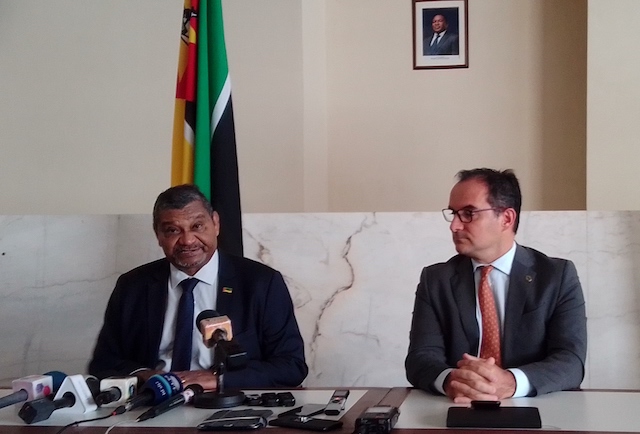Mozambique: German Development Cooperation receives award for their support in youth employment by ...
Mozambique did not fall in Doing Business index “because it did nothing”, but because “other countries did more than us”

Photo: Adérito Caldeira / A Verdade
Following Mozambique’s fall in the World Bank’s Doing Business 2020 index, the Minister of Industry and Trade acknowledged that “Mozambique did not go down because it did nothing; what happened was that other countries did more than we did, faster than we did.”
Speaking to @Verdade, Ragendra de Sousa reiterated that the government was committed to improving the business environment, because “without investment there is no growth”.
@Verdade has already reported that Mozambique regressed in 9 out of 10 business environment indicators, and therefore fell from 135 to 139 in the Doing Business 2020 report, with only the building permit requirement having improved.
In the view of the Confederation of Economic Associations (CTA), this worsening of the business environment was particularly the result of six reforms approved by the government not having been implemented.
Changes to the Commercial Code, which now allows the publication of only a simplified extract of the new commercial company statute, for example, are practically unknown to Mozambican entrepreneurs.
The Private Management Credit Information System created in 2015 and regulated for in 2016 is still incipient, and although regulations have been in place since 2015 to make Value Added Tax (VAT) refunds more efficient, the CTA complains that “some requests still take more than 18 months to process”.
The implementation of the legal regime for insolvency and recovery of commercial entrepreneurs, approved in 2013, has been delayed.
In international trade, pre-shipment inspection should have been withdrawn by 2018 and the institutions issuing the necessary permits for international trade integrated into the Single Electronic Window, such as the Ministries of Agriculture, Health and Industry and Trade, but they have not been so.
“We have had more than eight or nine reforms, of which some are taking time to become apparent.”
In response to @Verdade’s questions, the Minister of Industry and Commerce began by recognising that “Mozambique did not go down because it did nothing; what happened was that other countries did more than we did, faster than we did.”
“To give you an example, we have already passed the Commercial Code in the Council of Ministers. It now has to go to the Assembly [parliament] , and it has implications. Another good example is that we made the public announcement that for companies it is no longer necessary to print the statutes in full in the Boletim da Rapubica [Government Gazette], only two pages, the cost went down from 40 to 2. This was done within the last year, but our private sector has reported that it does not know. So, we will make it known. We are not anxious,” Ragendra de Sousa said.

“We have carried our more than eight or nine reforms; that takes time to be perceived. We are not on the defensive. We see this rating as an incentive to further improve, and we will liaise with businesspeople to make the benefits better known,” the minister indicated.
“For example, previously, we had the company registration done at the Fonte Azul building: the agent had to take papers and go to BAU to take another. How long did that take? Now it’s all in the same office. We closed the office in the Fonte Azul building and we put it there [in the BAU building], and the businessperson talks to just one person. Hasn’t this reduced the time it takes? It has for us. The next thing is to put everything on the same computer, so let’s do that this year,” Ragendra de Sousa promised.
The Minister of Industry and Commerce also made it clear that “the government is one of the biggest stakeholders when it comes to improving the business environment – so that entrepreneurs feels good, and so that more investments come in.”
“Because, dear fellow citizens, without investment, there is no growth. If we want to grow to have more jobs and improve our salary, we have to promote investment. Gross domestic product doesn’t come from talk – but if I produce more, it grows. It is the government’s primary interest to improve the business environment and promote development,” he concluded.
By Adérito Caldeira












Leave a Reply
Be the First to Comment!
You must be logged in to post a comment.
You must be logged in to post a comment.